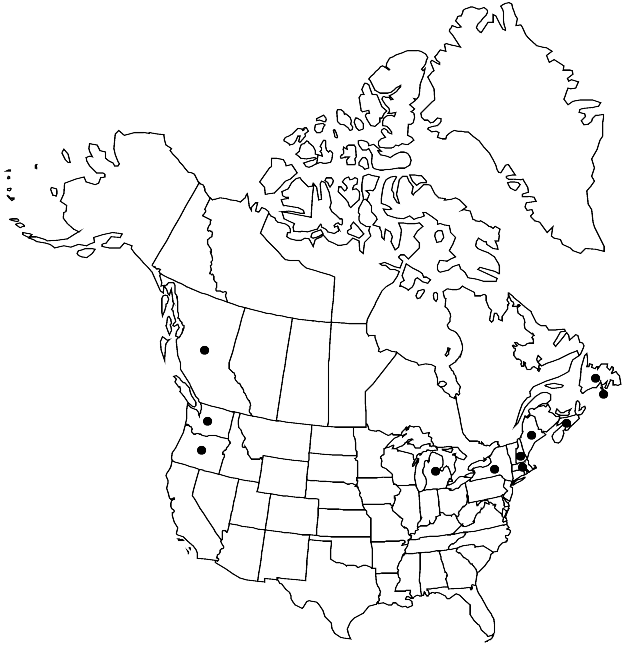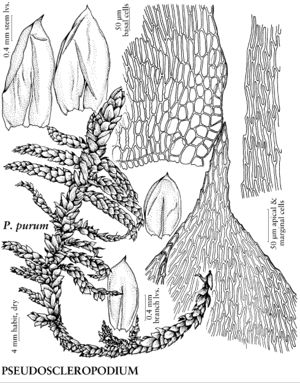Difference between revisions of "Pseudoscleropodium purum"
in H. G. A. Engler et al., Nat. Pflanzenfam. ed. 2, 11: 395. 1925.
FNA>Volume Importer |
FNA>Volume Importer |
||
| Line 32: | Line 32: | ||
|elevation=low to moderate elevations | |elevation=low to moderate elevations | ||
|distribution=St. Pierre and Miquelon;B.C.;Nfld. and Labr. (Nfld.);N.S.;Maine;Mass.;Mich.;N.H.;N.Y.;Oreg.;Wash.;Europe;introduced also in West Indies (Jamaica);South America;Asia (Japan;Malaysia;Sri Lanka);n Africa;Atlantic Islands (Azores;Canary Islands;Iceland;Madeira;St. Helena;Tristan da Cunha);Indian Ocean Islands (Reunion);Pacific Islands (Hawaii). | |distribution=St. Pierre and Miquelon;B.C.;Nfld. and Labr. (Nfld.);N.S.;Maine;Mass.;Mich.;N.H.;N.Y.;Oreg.;Wash.;Europe;introduced also in West Indies (Jamaica);South America;Asia (Japan;Malaysia;Sri Lanka);n Africa;Atlantic Islands (Azores;Canary Islands;Iceland;Madeira;St. Helena;Tristan da Cunha);Indian Ocean Islands (Reunion);Pacific Islands (Hawaii). | ||
| − | |discussion=<p>Pseudoscleropodium purum is considered a troublesome lawn weed on the Pacific coast, leading to a thriving moss-killer industry. The species is tolerant of mowing and two to three months of summer drying, and it flourishes in winter. It is always in anthropogenic habitats, and was probably introduced in packing material for nursery stock, possibly disseminated inadvertently from one lawn to another by professional lawn-care workers. Additional information on this unusual moss has been presented by E. Lawton (1960), N. G. Miller (2000), and Miller and N. Trigoboff (2001).</p> | + | |discussion=<p><i>Pseudoscleropodium purum</i> is considered a troublesome lawn weed on the Pacific coast, leading to a thriving moss-killer industry. The species is tolerant of mowing and two to three months of summer drying, and it flourishes in winter. It is always in anthropogenic habitats, and was probably introduced in packing material for nursery stock, possibly disseminated inadvertently from one lawn to another by professional lawn-care workers. Additional information on this unusual moss has been presented by E. Lawton (1960), N. G. Miller (2000), and Miller and N. Trigoboff (2001).</p> |
|tables= | |tables= | ||
|references= | |references= | ||
| Line 56: | Line 56: | ||
|publication year=1925 | |publication year=1925 | ||
|special status=Selected by author to be illustrated | |special status=Selected by author to be illustrated | ||
| − | |source xml=https://jpend@bitbucket.org/aafc-mbb/fna-data-curation.git/src/ | + | |source xml=https://jpend@bitbucket.org/aafc-mbb/fna-data-curation.git/src/8f726806613d60c220dc4493de13607dd3150896/coarse_grained_fna_xml/V28/V28_705.xml |
|genus=Pseudoscleropodium | |genus=Pseudoscleropodium | ||
|species=Pseudoscleropodium purum | |species=Pseudoscleropodium purum | ||
Revision as of 18:07, 18 September 2019
Plants in soft carpets or turfs. Stems 2–15 cm, regularly pinnate in protected sites, irregularly branched in mowed lawns, branches 1–3 cm; rhizoids absent. Stem leaves incurved, 2–2.5 mm; margins plane; apiculus abruptly reflexed; costa single; laminal cells 50–80 µm, smooth. Branch leaves 1–2 mm. Sporophytes unknown in North America.
Habitat: Lawns of urban areas, cemeteries, forest edges, discarded lawn clippings
Elevation: low to moderate elevations
Distribution

St. Pierre and Miquelon, B.C., Nfld. and Labr. (Nfld.), N.S., Maine, Mass., Mich., N.H., N.Y., Oreg., Wash., Europe, introduced also in West Indies (Jamaica), South America, Asia (Japan, Malaysia, Sri Lanka), n Africa, Atlantic Islands (Azores, Canary Islands, Iceland, Madeira, St. Helena, Tristan da Cunha), Indian Ocean Islands (Reunion), Pacific Islands (Hawaii).
Discussion
Pseudoscleropodium purum is considered a troublesome lawn weed on the Pacific coast, leading to a thriving moss-killer industry. The species is tolerant of mowing and two to three months of summer drying, and it flourishes in winter. It is always in anthropogenic habitats, and was probably introduced in packing material for nursery stock, possibly disseminated inadvertently from one lawn to another by professional lawn-care workers. Additional information on this unusual moss has been presented by E. Lawton (1960), N. G. Miller (2000), and Miller and N. Trigoboff (2001).
Selected References
None.
